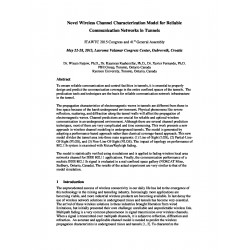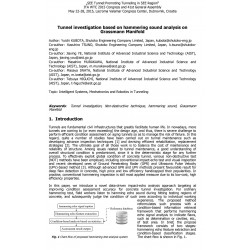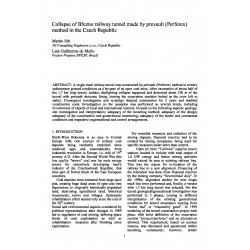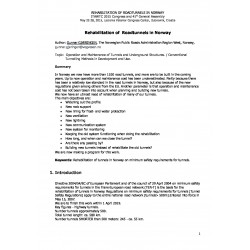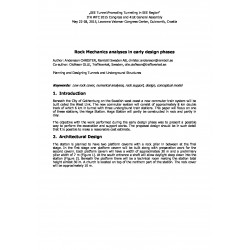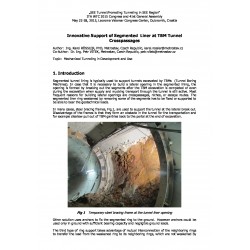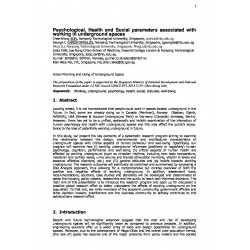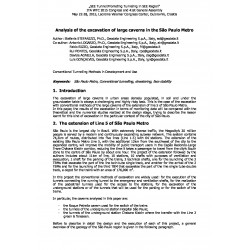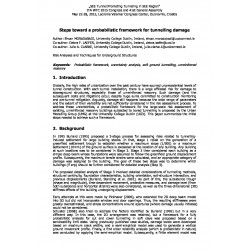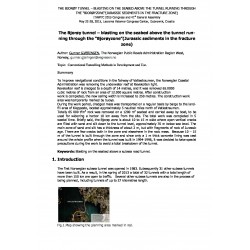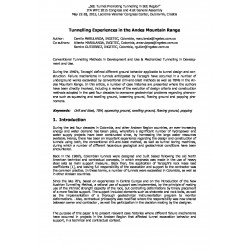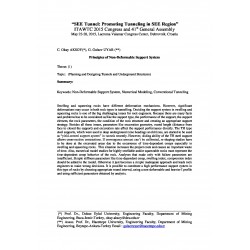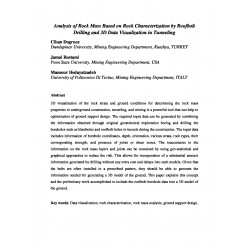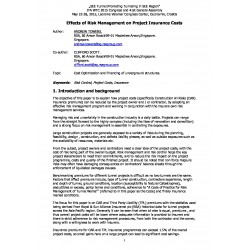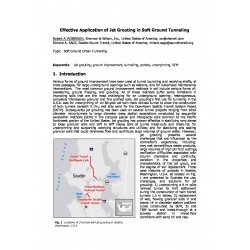No document
Search & filter
Search for a publication
Search & filter
World Tunnelling Congress
WTCThere are 1984 documents.
-
Novel Wireless Channel Characterization Model for Reliable Communication Networks in Tunnels
Abstract: To ensure reliable communication and control facilities in tunnels, it is essential to properly design and predict the communication coverage in the entire confined spaces of the tunnels. The predication tools and techniques are the basis for reliable communication network infrastructure in the tunnel. The propagation characteristics of electromagnetic waves in tunnels are different from those...
0,00 € -
Tunnel investigation based on hammering sound analysis on Grassmann Manifold
Abstract: Tunnels are fundamental civil infrastructures that greatly facilitate human life. In nowadays, more tunnels are coming to (or even exceeding) the design age, and thus, there is severe challenge to perform efficient condition assessment on aging tunnels so as to manage the risk of failure. In this regard, quite a number of studies have been carried out on tunnel maintenance such as developing...
0,00 € -
Collapse of Březno railway tunnel made by prevault (Perforex) method in the Czech Republic
Abstract: A single track railway tunnel was constructed by prevault (Perforex) method in tertiary sedimentary ground conditions as a by-pass of an open coal mine. After excavation of about half of the 1,7 km long tunnel, sudden, daylighting collapse happened and destroyed about 100 m of the tunnel with prevault shotcrete lining, leaving the excavation machine buried as the crew left to safety. Consequent...
0,00 € -
Rehabilitation of Roadtunnels in Norway
Abstract: In Norway we now have more than 1100 road tunnels, and more are to be built in the coming years. Up to now operation and maintenance cost has been underestimated. Partly because there has been a relatively low standard in the road tunnels in Norway, but also because of the new regulations given among others from the EU. Another parameter is that operation and maintenance cost has not been taken...
0,00 € -
Rock Mechanics analyses in early design phases
Abstract: Beneath the City of Gothenburg on the Swedish west coast a new commuter train system will be built called the West Link. The new commuter system will consist of approximately 8 km double track of which 6 km in tunnel with three underground train stations. This paper will focus on one of these stations, the Haga Station. Haga Station will partly be constructed in rock and partly in clay. The...
0,00 € -
Innovative Support of Segmented Liner at TBM Tunnel Crosspassages
Abstract: Segmented tunnel lining is typically used to support tunnels excavated by TBMs (Tunnel Boring Machines). In case that it is necessary to build a lateral opening in the segmented lining, the opening is formed by breaking out the segments after the TBM excavation is completed or even during the excavation when supply and mucking transport through the tunnel is still active. Most frequent reasons...
0,00 € -
Psychological, Health and Social parameters associated with working in underground spaces
Abstract: In this study, we present the key elements of a systematic research program aiming to examine the relationship between the design, environmental and architectural characteristics of underground spaces with critical aspects of human behaviour and well-being. Specifically, our program will examine how (i) working underground influences (positively or negatively) human psychology, cognition,...
0,00 € -
Analysis of the excavation of large caverns in the São Paulo Metro
Abstract: The excavation of large caverns in urban areas densely populated, in soil and under the groundwater table is always a challenging and highly risky task. This is the case of the excavation with conventional methods of the large caverns of the extension of line 5 of São Paulo Metro. In this paper, the results of the excavation in terms of monitoring data will be compared with the theoretical and...
0,00 € -
Steps toward a probabilistic framework for tunnelling damage
Abstract: Globally, the high rates of urbanization over the past century have spurred unprecedented levels of tunnel construction. With each tunnel installation, there is a large affiliated risk for damage to aboveground structures, especially those of unreinforced masonry. Such damage (and the subsequent costs and litigation) occur, despite huge sums committed to construction monitoring and pre-tunnel...
0,00 € -
The Bjorøy tunnel – blasting on the seabed above the tunnel run ning through the “Bjorøyzone” (Jurassic sediments in...
Abstract: To improve navigational conditions in the fairway of Vatlestraumen, the Norwegian Coastal Administration was removing the underwater reef at Revskolten light. Revskolten reef is dredged to a depth of 14 metres, and it was removed 65.0000 cubic metres of rock from an area of 12.000 square metres. After construction work is completed, the new sailing width is increased to 250 metres. The...
0,00 € -
Tunnelling Experiences in the Andes Mountain Range
Abstract: During the 1940’s, Terzaghi defined different ground behavior applicable to tunnel design and con- struction. Failure mechanisms in tunnels anticipated by Terzaghi have occurred in a number of underground works excavated by conventional drill-and-blast methods as well as TBMs in the An- des Mountain Range. In this article, a number of case histories are presented where the authors have been...
0,00 € -
Two-component Backfill Grouting for Double Shield TBMs
Abstract: The $8.3 billion North West Rail Link (NWRL) is currently the biggest public transport project in Australia. It represents the first stage of the Sydney Rapid Transit scheme, the city’s new rapid transit railway network. Part of the project is the $1.15 billion NWRL tunnelling contract, which involves the construction of Australia’s longest railway tunnels - 15km twin-tunnels between Bella...
0,00 € -
Principles of Non-Deformable Support System
Abstract: Swelling and squeezing rocks have different deformation mechanisms. However, significant deformations may occur in both rock types in tunnelling. Deciding the support system in swelling and squeezing rocks is one of the big challenging issues for rock engineers. Because there are many facts and problems has to be considered as/like the support type, the performance of the support, the support...
0,00 € -
Analysis of Rock Mass Based on Rock Characterization by Roofbolt Drilling and 3D Data Visualization in Tunneling
Abstract: 3D visualization of the rock strata and ground conditions for determining the rock mass properties in underground construction, tunneling, and mining is a powerful tool that can help in optimization of ground support design. The required input data can be generated by combining the information obtained through original geotechnical exploration boring and drilling the boreholes such as...
0,00 € -
Effects of Risk Management on Project Insurance Costs
Abstract: The objective of this paper is to explain how project costs (specifically Construction All Risks (CAR) insurance premiums) can be reduced by the project owner and / or contractor, by adopting an effective risk management program and working in conjunction with the insurers own risk management services. Managing risk and uncertainty in the construction industry is a daily battle. Projects can...
0,00 € -
Effective Application of Jet Grouting in Soft Ground Tunneling
Abstract: Various forms of ground improvement have been used at tunnel launching and receiving shafts, at cross passages, for large underground openings such as stations, and for cutterhead maintenance interventions. The most common ground improvement methods in soil include various forms of: dewatering, ground freezing, and grouting. All of these methods suffer some limitations in improving soils that...
0,00 €

